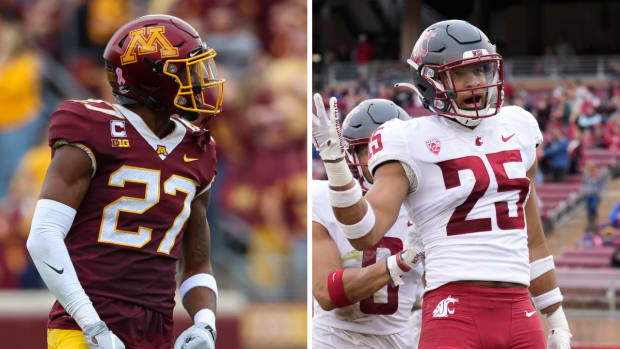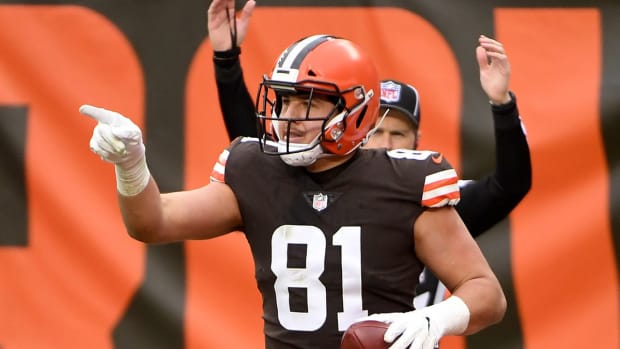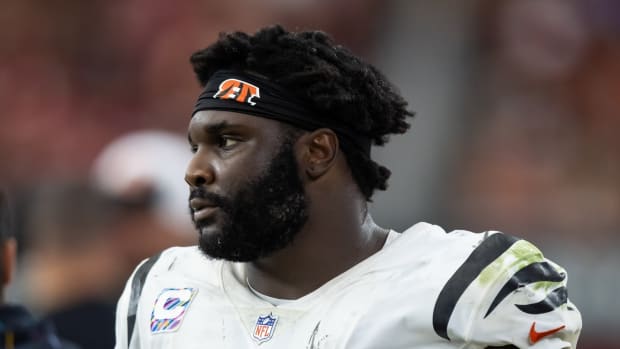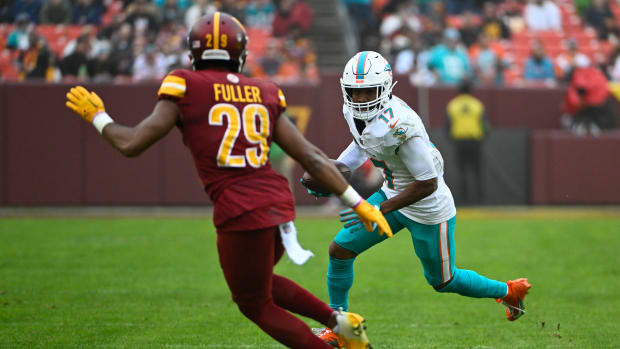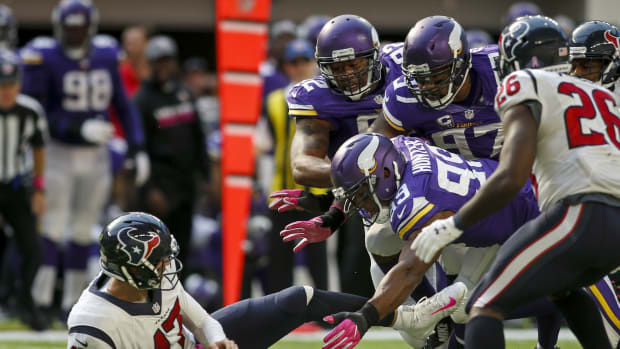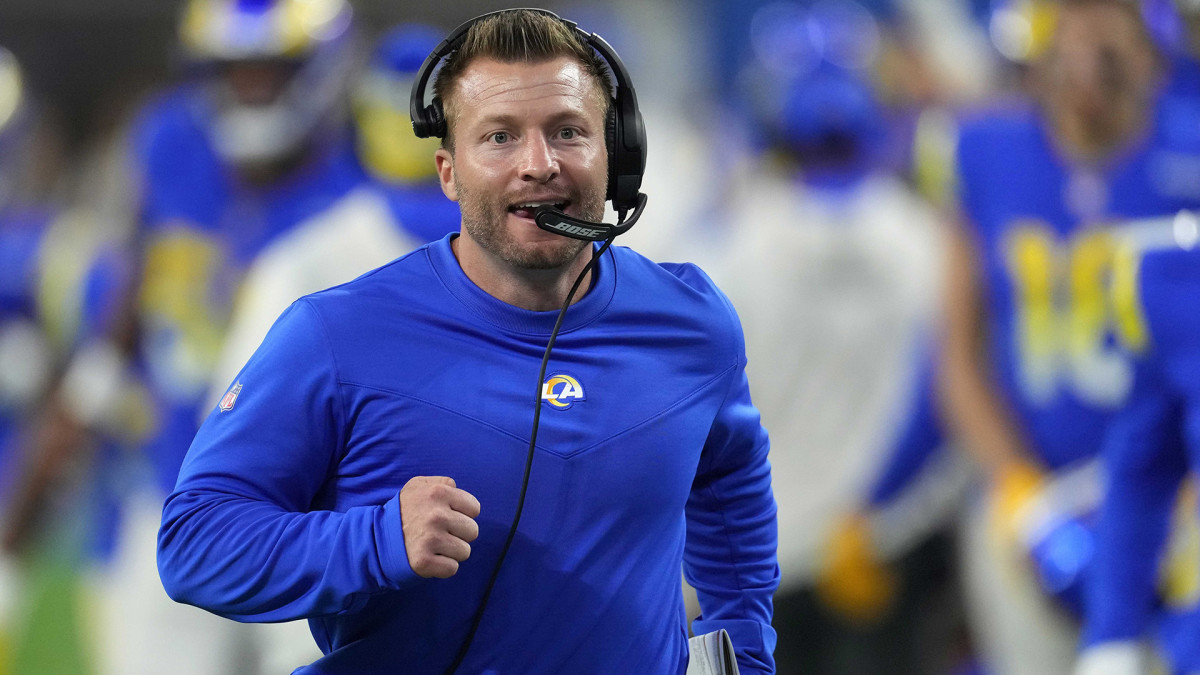
The Speech, 2.0: How Sean McVay Reached Back to the Past to Inspire the Rams
On Thursday afternoon, inside a tension-filled Rams headquarters, everyone in the building understood the backdrop, the history and the magnitude. In roughly 72 hours, they would host the 49ers, with a berth to Super Bowl LVI at stake. This game—and that game—would be held in their home venue, SoFi Stadium. They’d avoid the logistical headaches that come with having to travel. But before they could become both the second team in NFL history and the second in a row to play for a championship at home, they needed to confront their nemesis, the same opponent who had beaten them six straight times.
Two Rams, Sean McVay and Von Miller, met for a brief conversation that morning, the same week the edge rusher had enlightened his head coach. In enlightening McVay, Miller had focused on one moment that he believes sparked the Broncos team he starred for during their triumph in Super Bowl 50. He wanted McVay to recreate it.
That afternoon, McVay planned to pace the Rams through practice in full pads, hoping to sharpen them for the physical, tight affair everyone expected. McVay wondered if it was too early to re-create what they envisioned. But Miller smiled. He told McVay that when McVay chose to unveil their plan didn’t matter. How he’d unveil it did.
“We need this,” Miller says McVay told him.
Flash forward to late Sunday. A Super Bowl bid hung in the balance, close enough to touch. The 49ers offensive linemen had limited Miller more than any team the Rams faced this postseason. San Francisco led, 10–7, and expanded that lead with a third-quarter touchdown. The Rams’ odds dwindled. Within minutes, they’d shot back up. (Story of this postseason.)
Another backdrop presented itself, albeit one colored by the original, and leading to an obvious question a nation of football obsessives asked in unison. Would the 49ers beat the Rams again?
Just after the two-minute warning, the Rams settled for a short field goal and a 20–17 lead. Only 1:09 remained. The 49ers held the ball, but faced a third-and-13.
Nothing had come easy to L.A. all afternoon and evening—not moving the ball, not generating the pass rush opponents had come to fear. But on this play, when it most mattered, here it came. Miller began the swarm from the right side of the offensive formation, and he went wide, bringing the tackle with him. The Rams rushed five defenders on the play, but that widening, the space it opened, and the rushers who took up the blockers on the left side of the line meant that only Aaron Donald needed to push through.
Donald is the most feared defender in football, and the opening left him one-on-one. He moved his blocker backward, as if the SoFi Stadium turf were farmland to be plowed, and when Donald grabbed hold of Jimmy Garoppolo, he twisted the quarterback around. As Garoppolo whirled toward the ground, he heaved a desperation toss toward the left sideline. Linebacker Travin Howard happened to be perfectly positioned there; he settled under the lob and caught it, sealing the Rams’ return to the Super Bowl, their second appearance in the game the past four seasons.
Miller jogged toward the sideline, a smile as wide as the moon spread across his face. He wrapped McVay in a tight embrace that threatened the coach’s perfectly aligned hair spike and headset. The television announcers reminded a national audience that the Rams had not registered a single sack on Sunday, and yet, had come up with “something even better on that third-down play.”
Perhaps, at that moment, Miller and McVay shared the same thought. Maybe they looked back to Thursday, when McVay delivered what should now be known as The Speech, 2.0.
DeMarcus Ware and Peyton Manning stood before their Broncos teammates in late January 2016. They wanted the final address before the AFC championship game to land with the force of a haymaker, and they had already settled on how: a speech, a trophy and a message. Like a sports movie sprung to life.
All season, Denver’s players had leaned on the same themes, repeating them to each other: grind until you can’t grind anymore and iron sharpens iron and, extending that notion, one man sharpens another. Manning reminded his audience of the stakes that Sunday against New England; he had won a Super Bowl (with the Colts), and he promised they would never forget the feeling if they could do the same. Then he ceded the floor to Ware, a defensive end in his 11th campaign who had never won a championship and believed his hourglass was almost out of sand.
As Ware started to speak, the locker room went silent. He reminded the Broncos of the “grit” they displayed that season, the work they had done since the previous August, all the ups and downs. “We molded a piece of iron,” he said, voice rising. “It’s the most important weapon that we have. It’s the steel in our hearts.” Teammates began to murmur, perking up, stealing glances around the room.
Ware knew he had their attention. He told them to close their eyes. “I want you to think about that work,” he said, voice booming. “I want you to think about our steel mill, where we built the strongest weapon any of us have ever made. And it’s that steel in your heart, it’s beating right now. Do y’all feel that?”
He told the Broncos to keep their eyes closed, then turned to a pair of security guards who had been standing nearby, out of sight. One handed him a backpack, which Ware opened. He reached inside and took out the Lombardi Trophy that Denver won in the 1998 season and placed it on a folding table loud enough that it clanked.
“Open your eyes,” Ware said.
Teammates jumped up. Took notice. Started yelling. Slapping hands. Bumping chests. Ware even saw tears forming in more than a few eyes. He motioned for quiet, then pointed at the trophy, telling the Broncos that this was what they built their weapon for, to seize their own Lombardi and raise it exultantly above their heads. The Patriots, he continued, voice still booming, planned to come to Denver, neutralize their weapon and leave the Broncos with zilch, all their work for naught. “There was something that just came over the room,” Ware says. The players had been whipped into a frenzy. When they left, Ware told them, he wanted them to touch the trophy on their way out. Then he dropped a metaphorical microphone, told them all to have “sweet dreams,” and walked out of the room.
As he strolled away, mission complete, Ware could hear the camaraderie echoing off the walls. His team did beat the Patriots, then toppled the favored Panthers in the Super Bowl. And for Von Miller, a young pass rusher who touched the Lombardi Trophy that afternoon and would be named Super Bowl MVP that season, the push that tipped Denver toward a title started in one place and with one, specific thing. Five years later, now in Los Angeles, now a Ram and now, more or less, in the role that Ware once held, Miller needs only two words to explain the impetus.
The and Speech.
Miller answered his cellphone late last Friday, after a day spent at the Rams facility, after practice and hours of extra recovery work. Another conference championship game would be held in less than 48 hours. The Rams would again face their division rival and their recent history, both against the 49ers and in the postseason, where good had not yet been enough.
As Miller listened to an interview of Ware recounting his sermon from five years ago, he laughed. He was able, all these years later, to transport back in time. Only now he had another speech to compare to the original; the idea of which he generated, in the same way he generates everything, by dreaming lofty dreams, before handing this one to McVay.
Miller had started planting similar Super Bowl seeds after arriving in Los Angeles when the Broncos traded him to the Rams on Nov. 1. He took the replica Lombardi Trophy he had made and placed it just outside the team’s equipment room, where his teammates would see it, daily, as they headed back to the locker room. Most days, he would attach a different note. Like: If you were waiting to have your best game, this is it. Or: maximum effort.
After speaking with McVay on Thursday, he waited, his anticipation heightened relative to his teammates. His coach had not confirmed the timetable, had not said when he planned to deliver his own plea.
This being 2022, McVay held the meeting that afternoon over videoconference, everyone watching from different rooms inside the same building in Thousand Oaks. This is Miller’s recollection of what happened next: His coach told his teammates that he was certain of their alignment, that if he asked any of them what they needed to do to win that Sunday, all would know, without doubt or hesitation. McVay called out Donald first. “AD, what do we have to do to win this game?”
“Dominate,” Donald instantly responded.
McVay turned next to left Andrew Whitworth, the oldest position player not named Brady still playing in the NFL. McVay asked Whitworth the same question.
“Win the one-on-ones,” Whitworth said.
Eric Weddle, the veteran safety the Rams lured out of retirement this month, went next.
“We gotta go out there and make plays,” he answered.
“Everybody was in alignment,” Miller says. Just as his coach had predicted at the meeting’s outset, the tie important, with the potential to propel them forward, upward, onward.
After several other players responded, McVay went for the crescendo. He didn’t ask the Rams to close their eyes like Ware had implored the Broncos. But he did reach behind his desk and grab a trophy. It wasn’t Miller’s replica; it was the Rams’ Lombardi. They had won it in the 1999 season, playing in St. Louis.
“Von,” McVay said, “this is not the replica; this is the real thing.”
McVay placed the trophy on his desk and guess what Miller heard? Clank.
Nobody touched the Lombardi on the way to practice. But all the Rams walked by it; some gazed, others danced or bowed. Miller paused, a veteran now, taking in the significance. While he wasn’t there all season, he had been a Ram for about 10 weeks, and he couldn’t remember a better, more productive workout session. “It had the same type of feeling as the other speech,” he says, adding that he confirmed his own déjà vu with Thad Bogardus, a Broncos assistant in 2016 and now the Rams assistant linebackers coach.
At that point, the Rams resembled a carbon copy of the Broncos in several important ways. They had a veteran quarterback seeking a ring before retirement (Matthew Stafford now, Manning then), a dominant defense featuring a future Hall of Famer (Donald now, Ware then) and Miller, elite wide receivers, a strong running game, and the kind of momentum that heightened Super Bowl aspirations. At that point, to keep the parallel alive, all the Rams had to do was show up on Sunday and win.
Easier said than done, of course. The Rams scored the first touchdown Sunday, after completing an 18-play, 97-yard drive that ate up almost 10 minutes of game clock.
Still, L.A. continued to struggle with a typical problem San Francisco posed for defenses that wouldn’t just need to stop running back Elijah Mitchell, forcing pass attempts that doubled as obvious pass rushes. They would need to slow him and wideout Deebo Samuel, a player whose versatile skill set made him half-receiver and half-halfback, allowing Kyle Shanahan, McVay’s mentor, to lace even basic plays with even more confusion. Throw in George Kittle, Brandon Aiyuk and role players tailored for specific moments, plus the speed of an Olympic track team, and the blueprint to beat the Niners had morphed over this season into one aim: pressure Garoppolo into mistakes.
The Rams weren’t getting any pressure, and the 49ers answered, immediately, in roughly one-fifth of the time the Rams needed to score. Of course, Samuel provided the response with a 44-yard touchdown catch-and-run from Jimmy G. The game tightened, right then. Both teams attempted a field goal before halftime; the Rams’ Matt Gay missed from 54 yards, while the Niners’ Robbie Gould sailed a 38-yard attempt through the uprights.
Back and forth it went. San Fran extended its lead with another Garoppolo touchdown pass in the third quarter. It went to Kittle, after the Rams had adjusted for Samuel’s impact.
The 49ers still led, 17–14, when the Rams defense forced a punt. Much like in L.A.’s win over the Buccaneers a week earlier, Stafford led the offense on a late, pivotal drive. McVay called timeout with 19 seconds remaining in the third, and his decision seemed odd, momentarily, if only for a few moments. On the next play after the break, the Rams deployed a little trickery in the form of a flea-flicker that freed rarely used tight end Kendall Blanton—on the field due to an injury to starter Tyler Higbee—who took it for a 20-yard catch-and-run, converting a pivotal third down.
The third quarter ended. The drive resumed, and Stafford countered, despite an early interception. He lofted his second touchdown pass to Cooper Kupp on Sunday; this time, Kupp caught it on a nifty corner route early in the fourth. The Rams forced another punt. Stafford piloted another swift drive down field; but, this time, L.A. stalled, setting up the 30-yard field goal Gay booted. Then: the pressure (win the one-on-ones), the interception (gotta go out there and make plays) and the Super Bowl berth secured (dominate, kinda), along with the celebration and the harkening back to the new version of The Speech.
Speaking of, Miller had noticed one other detail about the trophy from Super Bowl XXXIV. It wasn’t shiny; certainly not shiny enough. He paused on Thursday, struck by a sentiment, understanding better than the majority of his teammates that only smudges can steal a Lombardi Trophy’s shine. Each fingertip or lip smear told a story: of a player and how they fit into that particular team and how that particular team put together a special season. Like those Broncos. And these Rams. “It just had this energy about it,” Miller says, meaning the trophy in that moment. “It just felt like, no matter what people do, this is not going anywhere. The 1999 Rams are going to have this forever.”
He had continued to deliver similar reminders. Yes, San Francisco had won six straight. But all the Rams needed to do now, on this Sunday, was win once, when it mattered most. And when they did, Miller’s parallel to 2015–16 continued, while his aims changed and grew. Now, he wants the same ending the original speech once inspired.
“We got a great spirit about this team,” Miller says, “and that same kind of energy from that season.”
More NFL Coverage:
• Von Miller Is Dreaming Another Dream
• Cooper Kupp’s Scientific Approach to Greatness
• Joe Burrow’s Rise, Through the Eyes of His Parents

































